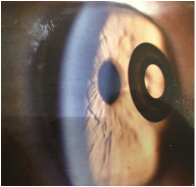Kamra Intra-corneal Inlay

Kamra is the latest intracorneal inlay developed by AcuFocus to essentially reverse the effects of presbyopia and restore near and intermediate vision without sacrificing distance vision clarity. Remember, presbyopia is a condition that usually occurs around the age of 40, whereby the eye exhibits a progressively diminished ability to focus on near objects.
Candidates for this inlay are those who do not require corrective lenses for distance, but only require corrective lenses for near and intermediate tasks. As you can see from the image on the left, the inlay is an opaque circular micro-disc with a 1.6-mm central opening. The inlay design is based on the principle behind an F-stop on a camera. When the lens aperture is very small, objects at various distances come into focus simultaneously. This "small-aperture optics" (think pinhole effect) increases a patient's depth of focus.
The two really nice features of the Kamra inlay are : (1) it is removable and (2) it maintains binocularity at distance (unlike with monovision LASIK where you can lose some depth perception). The inlay can be implanted in patients who have had prior cataract or refractive eye surgery.
The bad news. The Kamra inlay is not currently approved for use in the United States. It is however approved in 46 countries and was approved in Canada in September 2012. It is also not recommended for patients with specific systemic conditions such as autoimmune disorders, keratoconus, severe and uncontrolled dry eyes, age-related macular degeneration and amblyopia ("lazy" eye).
Stay tuned for more updated information.
Candidates for this inlay are those who do not require corrective lenses for distance, but only require corrective lenses for near and intermediate tasks. As you can see from the image on the left, the inlay is an opaque circular micro-disc with a 1.6-mm central opening. The inlay design is based on the principle behind an F-stop on a camera. When the lens aperture is very small, objects at various distances come into focus simultaneously. This "small-aperture optics" (think pinhole effect) increases a patient's depth of focus.
The two really nice features of the Kamra inlay are : (1) it is removable and (2) it maintains binocularity at distance (unlike with monovision LASIK where you can lose some depth perception). The inlay can be implanted in patients who have had prior cataract or refractive eye surgery.
The bad news. The Kamra inlay is not currently approved for use in the United States. It is however approved in 46 countries and was approved in Canada in September 2012. It is also not recommended for patients with specific systemic conditions such as autoimmune disorders, keratoconus, severe and uncontrolled dry eyes, age-related macular degeneration and amblyopia ("lazy" eye).
Stay tuned for more updated information.